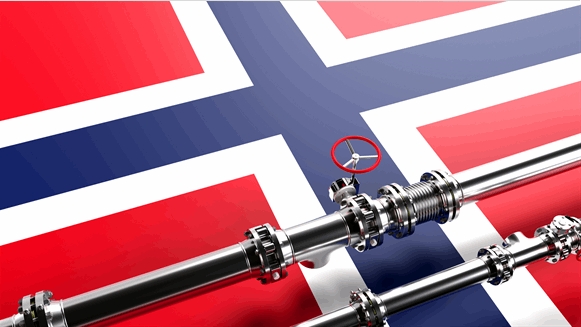
Delivery was to start October 2023.
“RWE and Equinor have signed a new supply contract for between 10 and 15 terawatt hours (equivalent to ca. 1 – 1.5 billion cubic meters – bcm) of natural gas per year from now until 2028”, Norway’s majority state-owned Equinor said in a press release.
The supply is priced on Germany’s virtual Trading Hub Europe.
“Germany and Norway have been energy partners ever since Norwegian gas exports first started more than 45 years ago”, Equinor senior vice-president for gas and power Helge Haugane said in a statement for the announcement.
Germany is “one of many companies that see Norwegian gas as an enabler for energy security as well as of the energy transition”, Haugane added.
Equinor earlier secured another European client in Austria. It said September 27 it has scored a five-year contract from OMV AG to supply 12 tWh of gas annually to the Austrian company.
"The gas will be delivered at Germany’s virtual trading hub THE for the OMV European portfolio", Equinor said in a news release at the time.
Delivery was to start October 2023, the Austrian state-backed OMV said in its own announcement.
Norway remained the European Union’s top pipeline gas exporter during the first quarter of 2023 accounting for 53 percent or 21.7 billion cubic meters (766.33 billion cubic feet), according to the bloc’s latest quarterly gas market report published October 6. That marked an increase from 47 percent in the prior quarter and 28 percent in the same period in 2022, according to the report accessible through the European Commission website.
In Germany last year, Norway accounted for 33 percent of total natural gas import of 1,449 tWh to overtake Russia (22 percent) as the top supplier, according to a report by the German Federal Network Agency, the country’s main infrastructure authority, on January 6, 2023.
The Nordic country had been Europe’s number two source of natural gas next to Russia before Russia invaded Ukraine February 2022. Amid trade sanctions against the Putin regime over the war, Norway overtook Russia as the EU’s top natural gas exporter last year. Norway accounted for 24.4 percent of the region’s imports 2022, compared to 15.3 percent from Russia, according to a bulletin update May 3 by the EU statistics agency Eurostat.
Germany declared an alert level status for gas supply June 2022 after Russia reduced deliveries “resulting in a considerable deterioration in the supply situation”, the German government said in a press release June 23.
The Nord Stream pipeline connecting Germany and Russia resumed supply July 2022 after closing for what the operator said was maintenance, according to a July 21, 2022 news release by pipeline operator Nord Stream AG.
But the Baltic Sea pipeline took damage September 2022 in an apparent sabotage for which no culprit has been officially named. A report by Russian state media TASS May 20, 2023 said Nord Stream remained “completely suspended”.
However German Finance Minister Christian Lindner told BBC in a report January 18, 2023 his country was no longer dependent on Russian energy: “Yes, of course Germany is still dependent on energy imports, but today, not from Russian imports but from global markets”.